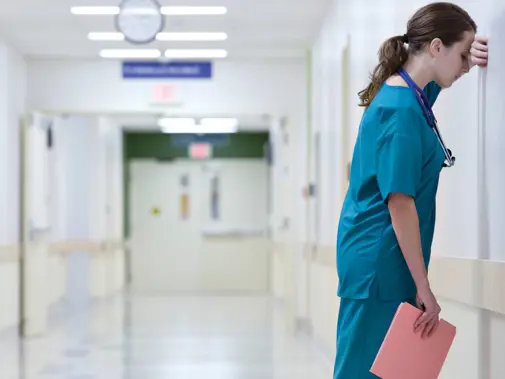Burnout is not a foreign concept to junior doctors – in fact, it may be experienced far more often than it is recognised.
Whether it is a product of work overload, intensity, or fatigue, burnout continues to affect healthcare professionals worldwide and has been inevitably exacerbated by the onset of the COVID-19 pandemic.
In a study carried out by HEE, one in three of the NHS workforce reported feeling unwell owing to work-related stress in 2019 and it is only likely that these numbers have increased in the past months.
The pressures on psychiatric trainees have increased in parallel with other specialties and treating patients in mental health settings during the pandemic has presented its own set of challenges and demands.
Despite burnout having been discussed at length in the recent months, the unique difficulties associated with mental health provision appear to be underrepresented.
The feelings produced by burnout have an inevitable damaging effect on staff wellbeing, which in turn, has numerous consequences on service provision.
The Boorman Review in 2009 identified three domains which were affected by poor wellbeing and included patient safety, patient experience, and the effectiveness of patient care.
The review also noted that NHS organisations did not prioritise staff health and wellbeing and response to poor health was reactive rather than proactive. Poor wellbeing was associated with increased absence rate, increased turnover rate, reduced patient satisfaction, and increased MRSA rate.
Stress levels have increased across all fields, with many having to learn how to re-adapt, and in some cases, re-define their roles at their workplace.
Nevertheless, within the mental health services, the persistent pressures associated with a concerted, consistent response to the pandemic have impacted overall employee wellbeing.
Workplace causes of burnout included reduced access to PPE despite face-to-face exposure, increased cases of ‘stepping up’ due to lack of staff and rota gaps, management of swabbing/COVID-19 restrictions in an acutely unwell mental health patient (requiring seclusion at times), and management of physically unwell patients with limited physical health-trained nursing staff or equipment to support.
Furthermore, with services transferring to online modalities, trainees have had to interpret deteriorating mental states over camera, conduct psychotherapy remotely, and have had reduced ‘positive’ interactions with other colleagues due to COVID-19 restrictions.
The evidence shows that while burnout may be identified in the individual, its consequences are ubiquitous.
Despite this, burnout is yet to be normalised and trainees frequently experience psychological distress when raising concerns regarding their own wellbeing – many fear to call in sick due to feelings of guilt.
This is compounded by a sense of obligation, otherwise colloquially known as a ‘hero complex’, that is propagated in large by the external perception of doctors and how they should behave.
An additional important aspect when considering burnout, are the ramifications of moral injury.
In the present climate, doctors and other healthcare professionals are facing difficult decisions in an understaffed, underfunded, and exhausted system.
We are apologising for things far beyond our control such as impacting the rights of our patients by suspending leave and still dealing with the impact of the first wave.
The ways we used to cope with stress such as relaxing in the mess, have been masked in their own way, and consequently, of detriment to those who desperately need it.
In such troubled times, the only alternative to our previous coping skills is normalising burnout in order to foster psychological safety, thereby helping staff safety, satisfaction, and retention.
The NHS, and particularly the mental health services, is no stranger to pressure and it is important to understand and acknowledge how COVID-19 has highlighted the enormous struggles junior doctors face owing to burnout.
The key difference being that the coping mechanisms once employed to reconcile with the stress have now been removed.
We step into work, faced with unpredictability regarding new protocols, restrictions, and methods of practice that we need to adopt before seeing our first patient. We are confronted with pressure and stress and go home to a world that, like our service, is experiencing its own degree of chaos and just like everyone else.
Despite the myriad of solutions, wellbeing campaigns, and other initiatives, this issue will persist unless junior doctors feel safe to speak up and acknowledge that they are struggling.
Now more than ever, the NHS has to learn how to mitigate burnout by normalising it, to protect its staff so they in turn, can look after their patients.
Maria Vittoria Capanna and Anna Christina Morawski are core psychiatry trainees in London

